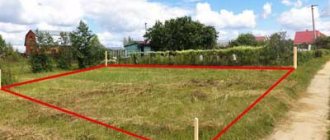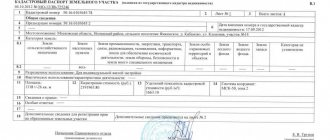Registration of ownership rights to a land plot is a legal act confirming the emergence and existence, as well as the transfer or termination of rights to real estate. After completing this document, you should not be required to provide any other papers confirming ownership. The right can only be challenged in court.
Title documents must be drawn up in accordance with the legislation of the Russian Federation. It is necessary that they contain a list and detailed description of real estate, as well as the type of right. All papers must be notarized, sealed and signed by the parties.
Standard property registration scheme
- This is possible if the owner has the necessary documents ready and updating the existing data is not yet required. You must have a passport, confirmation of the right to a land plot (contracts of donation, purchase/sale, lease, documents on the right of inheritance, court decisions, etc.), a cadastral passport of the plot. A receipt confirming that the citizen has paid the state duty is also attached here.
- The next step is that the owner must write an application to Rosreestr. It includes a request for registration, information about a plot of land of a cadastral and boundary nature, and passport data of an individual.
- Rosreestr issues confirmation that the documents have been accepted and reviews them within 7-9 days. If there are no discrepancies in the documents (for example, between rights that arose earlier), a corresponding note is made in the Unified State Register of Real Estate.
EGRN is the primary owner of property information
Important! You can also register ownership as private in a multifunctional center. The registration operation here is absolutely identical to that which occurs in Rosreestr, and the data received by these organizations replenishes the unified information bank. In addition to personal contact, citizens can use the services of regular or e-mail.
Upon completion of all aspects related to the registration of property rights, the citizen receives a corresponding certificate of ownership.
Obtaining a certificate of registration
This document is needed to confirm property rights. It is required when concluding all types of transactions with this property (purchase and sale, inheritance, shared construction, etc.).
Even if you are going to pledge the land to the bank, the employees will ask you to provide a certificate of registration.
You can obtain it by contacting the Rosreestr authorities in person. Recently, printing out the electronic version received on the government services website has become popular. To do this, you will need an xml file, which will be sent for verification, and immediately after that – for printing. This will save time and allow you to avoid waiting in line at the local government office.
How to pay state duty
The cost of the state duty varies depending on who pays it - an individual or a legal entity (hereinafter referred to as f/l and y/l), and the intended purpose of the allotment affects the price of the issue.
Minimum costs - 100 rubles - are expected for f/l and y/l, registering shares in common agricultural property.
350 rubles , whether an organization or an individual, will be spent when registering agricultural plots. For the same amount, land is registered for personal farming, building a garage, and planting a vegetable garden.
The price increases significantly for land plots with a house or a plot for individual housing construction: 2 thousand rubles for a f/l and 22 thousand rubles for a y/l.
If you pay electronically, it will be cheaper
The extract from the Unified State Register of Real Estate combines information from the Unified State Register of Rights Registration and the cadastral passport - it will cost 750 for a f/l and 2,200 rubles for a f/l if it is made on paper. In electronic form it is cheaper: 250 rubles f/l and 700 rubles u/l. An extract from the Unified State Register is necessary, as it makes it possible to obtain information about the real estate being registered before concluding a transaction to transfer the right to private ownership of land.
Grounds for refusal
They may refuse if:
- The site does not belong to the category of lands subject to registration.
- The act granting the right to own real estate was declared invalid.
- Not all conditions were listed in the documents (if they are made by a person with limited rights).
- Not all documents from the list were collected.
- There are errors in the papers (for example, if the owner changed his last name, place of residence, etc.).
- The person who issued the documents does not have official authority to manage this property.
- The application was filed by a person who does not have ownership rights.
How to get an extract from the Unified State Register for an apartment
Register an allotment for only 350 rubles
It is possible to do without extra costs, but this only applies to a rather narrow range of cases. A common option that citizens apply to when registering land ownership, when there is a certificate of the right to lifelong inheritable and permanent ownership of land (PNV). It is not enough to complete a purchase and sale transaction. It is necessary to register ownership according to the new laws.
Registration of land ownership is not always expensive
The big advantage of this case is that land surveying is not necessary here, and, consequently, costs are significantly reduced: the approximate cost of the necessary land surveying work ranges on average from 10 to 30 thousand rubles . Therefore, the question of how much it costs to register a plot of land will not frighten the owner with large numbers.
See also: Catalog of the most popular plots in the Moscow region intended for the construction of suburban real estate.
If the plot is inherited
Registration of inherited land costs 0.3% of the price of the plot - this applies to immediate relatives and 0.6% - for other persons. The notary issues a certificate of private ownership. The work of a notary will cost 5 thousand rubles . The declared amount will increase if the right to inheritance has to be defended in court.
It should be remembered that the object is recognized as real estate, and therefore it is necessary to register the allotment. To do this, you need to submit an application for state registration and provide a certificate received from a notary in addition to the standard list of documents. The state duty will be 350 rubles , for shared ownership - 100 rubles . State registration takes place within ten working days. Only after this the heir has the right of ownership to the acquired area.
State registration is one of the last stages
Application deadlines
You can start paperwork at any time, but it is important to remember how many days it will take for all the paperwork to be completed. Thus, 5 working days are allotted for consideration at Rosreestr, and up to 7 working days at the MFC.
Renovation of five-story buildings of unbearable series in Moscow
Before submitting an application, a package of necessary documents is collected, which includes a cadastral plan. If you do not have one, then you need to obtain a cadastral passport (available online) from Rosreestr. Provided that the size of the registered plot is known in advance, the preparation and certification of the plan will take up to 10 working days. After this, you receive a cadastral number for the land plot, and you can submit the remaining papers for registration.
A delay may occur if not all documents are collected at once, or if there are inconsistencies in them. In this case, the registration authorities send a request to verify the documents. This may take up to 30 days from the date of application.
The land was received under a gift agreement
As in previous options, ownership of the donated plot arises when the title to the land is registered with the state registration service. There is no need to register the contract itself and pay a state fee for it. Rosreestr registers the submitted documents, finds out whether the transaction is legal, and conducts a legal examination. The papers are assessed for the presence of contradictions between the rights to the object that already exist and those newly declared. When the owner receives a state registration certificate, it is difficult to challenge his rights; this is only possible by going to court.
The recipient is required to pay tax on the property received. It includes 13% of the cost of the plot if you are a resident of the state and 30% when you are not. The donor's immediate family is not required to pay tax. The owner, having received the plot, in order to avoid a fine of 1 thousand rubles , must submit a 3-NDFL declaration, indicating the cost of the plot.
The donation must also be formalized in accordance with the law.
Buying or selling a plot
Ownership rights may arise as a result of a purchase and sale transaction and the execution of a corresponding agreement. Such an agreement, according to current legislation, must be registered. You can resort to the services of a notary, and he will assure that the transaction was carried out legally, or contact Rosreestr or the MFC. Registration of the agreement in the Unified State Register of Real Estate makes it possible to use the land and make transactions with it. Registration of the contract and the right to property (do not confuse these concepts) can be completed online on the Rosreestr website or through the State Services portal.
The Tax Code, Art. 33: the fee will be 2 thousand rubles if no buildings were erected on the site; Registration of land with a house is estimated twice as much.
It is possible to register the right to land during purchase and sale by preparing an extended package of documents. To the usual set (passport, cadastral and survey documentation), an excerpt from the Unified State Register from the seller, powers of attorney from the seller and buyer, pre-certified, a certificate of ownership, the consent of the owners to sell the share and the consent of the spouse, a purchase and sale agreement (will be required) is added 3 copies), application for state registration, transfer document under the contract, payment of state duty certified by a receipt.
Each document is made in the required number of copies
State duty amounts
Registration of a land plot in Rosreestr or MFC costs the same, since the amount depends only on the type of territory being registered and who exactly concludes the transaction: a physicist or a representative of a legal entity.
Thus, for plots for personal use (dacha farms, garages, garden plantings, individual housing construction), the state duty will be 200 rubles. Moreover, low-income citizens can register for free - they just need to provide the appropriate document. This benefit is prescribed in the Housing Code of the Russian Federation.
For agricultural land, the duty amount for individuals and legal entities is also 200 Russian rubles.
But to register as a shareholder for a plot for farming, you will need to pay 50 rubles. The amount is valid for both individual developers and entrepreneurs.
All other areas are assessed on a different scale for individuals and legal entities. Thus, physicists will pay 1000 rubles for registration, representatives of legal entities - 15 thousand.
Leased plot
While the plot planned for registration as private property, in accordance with the new legislation, appears as being leased, transactions are not available for the leaseholder, because the plot officially belongs to the municipality. To register a plot as personal property, an application is written to the local municipality, and cadastral documents must be ready, payment for the purchase of the plot and state duty must be paid.
Important! Poor citizens have the right not to pay for the redemption of land.
It is possible to register ownership of leased lands if there is privatized property on them, the site was used for agricultural work or for its intended purpose.
Legalize a plot in SNT
The law on dacha amnesty, which appeared in 2006, and the articles of the Land Code of the Russian Federation, in force since 2015, significantly facilitate the process of registering territories for dacha ownership.
Thanks to the simplified system, ownership of land in gardening partnerships is transferred to individuals free of charge. The land at the dacha can be privatized or, under certain conditions - indefinite use, lifelong inheritance, lease agreement - purchased.
The dacha amnesty has simplified life for many
Plots that are not officially registered by the owner at a certain time and properly may pass to the state. Registration of a cadastral passport and paid state duty allow you to carry out activities for state registration of rights to a land plot. The limitation is this: the land must be assigned to the cooperative no later than October 30, 2001, and the dacha plot must be free of encumbrances. Of course, you will need papers that can confirm the right to property.
If you need to register the land under the house
In this situation, until the house and the plot itself are privatized, the property is considered illegally used, and transactions with it are impossible. When there are cadastral documents for a house, the owners may mistakenly believe that this is enough and do not care about registering the land directly under the house, but it is an integral part of the residential building (apartment). In order to have a cadastral number and a passport for the land, it is necessary to organize geodetic work, which includes topographic survey, measurement with land surveying, as well as clarification of the boundaries with neighbors' plots.
Based on these data, the private individual receives a technical extract, takes the documents to the cadastral organization, and attaches as confirmation a receipt confirming that the state duty has been paid. As a result, a certificate is issued confirming the owner’s right.
Certificate of Title Cap
Documents for registration
You will need:
- Documents confirming the registration of real estate in the cadastral register or state registration (agreements, acts of privatization of residential buildings, court inventories, certificates of inheritance).
- Technical or boundary plan indicating the cadastral number (KPZ).
- Originals of applications for state registration.
- Any identification document of an individual or representative of a legal entity (passport, etc.).
- If it is not the owner, but his representative, who applies to Rosreestr, it is necessary to prepare a document confirming the right to carry out transactions on behalf of the owner of the property.
- Agreement on the alienation of an object - in the case when organizations (limited liability companies) act as parties to the transaction.
- Original and photocopy of mortgage documents (if a mortgage is required).
- Receipt of payment of the fee for performing a government service.
Land acquired by squatting
When there are no papers for real estate, such an allotment is classified as obtained by self-capture. Any actions in such territories are illegal and subject to administrative liability. But there are ways that will help legalize these lands, making them private property.
A private individual needs to complete a purchase and sale transaction. When the land belongs to SNT or municipal authorities, it is necessary to submit an application to purchase the property. In circumstances in which the plot is the property of the state, it can be put up for auction (previously, the citizen contacts the authorized organization with a message about the desire to obtain the land into private ownership).
Purchasing at an auction makes it possible to register the ownership of land according to the scheme already discussed.
Providing a plot of land in the Moscow region through auctions for ownership or lease
Individuals and legal entities can purchase or rent land owned by the Moscow Region through auction. The corresponding service is provided by the Ministry of Property Relations of the Moscow Region. Read about what documents you will need to apply for a government service and the timing of its provision in the material on the mosreg.ru portal.
Restriction on participation in auctions for the sale of land plots
Auction
Source: , website of the Sergiev Posad district administration
Agricultural lands cannot be owned by: - stateless persons, foreign legal entities and foreign citizens; — legal entities in the authorized capital of which the share of foreign legal entities, foreign citizens and stateless persons is more than 50%. The listed categories of bidders can only lease agricultural land. One individual or legal entity is granted ownership of no more than 25% of the total area of farmland located on the territory of one municipality near Moscow.
Read how to get undelimited land plots in the Moscow region without bidding>>
How to get the service
To submit an application and the documents necessary to receive the service to the Ministry of Property Relations of the region, you can contact the territorial unit or multifunctional center in person. In addition, the applicant has the opportunity to use the electronic form on the portal of state and municipal services of the Moscow region.
Read how to get land for free in the Moscow region>>
Required documents
Pile of papers
Source: RIAMO, Alexander Kozhokhin
As mandatory documents, the applicant must submit an application for participation in the auction, a certificate of state registration of a legal entity and constituent documents of the legal entity. Additional documents include: - a document confirming the applicant’s identity; — certified translation into Russian of documents on state registration of a legal entity, if the applicant is a foreign legal entity; — a payment document confirming the transfer of the established deposit towards payment under the contract (the amount of the deposit is indicated in the documentation and information message regarding the auction).
Find out how to assign an address to a plot or property in the Moscow region>>
Result and timing of the provision of the service As a result of the provision of the service, the applicant receives: - a transfer and acceptance certificate in the event of the sale of a land plot; — lease or purchase and sale agreement of a plot or refusal to conclude an agreement; — protocol on the results of the auction or refusal of admission to participation in the auction; — notification of recognition of the auction as invalid; — return of the deposit and documents. For legal entities, the period for registering documents is one working day, the maximum period for providing services is 60 working days.
Read how to get approval for the architectural and urban planning appearance of a property in the Moscow region>>
Refusal to provide a service Grounds for refusal to provide a service or its suspension may be the refusal of the ministry to conduct bidding, the absence of a deposit at the time of consideration of applications for participation in the auction, the absence of documents necessary for participation in the auction, or the inaccurate information contained in them. In addition, the service may be denied to a person who does not have the right to participate in a particular auction. If the applicant is listed in the register of dishonest auction participants, this may also become a basis for refusal to grant it in the Moscow region: how to change the status of land>>
Procedure for appealing a refusal An applicant can appeal the procedure for providing a service to the Ministry of Property Relations or the Ministry of Public Administration of the Moscow Region by personal written application, through the regional public services portal, the portal of the Moscow Region government or the website of the Ministry of Regional Property, as well as through the multifunctional center. The period for consideration of a complaint by the regional Ministry of State Administration will not exceed 30 days and will be equal to the period for verifying the facts of a violation of the procedure for providing the service. The Ministry of Property Relations considers the complaint within 15 working days. More detailed information about filing a complaint can be found on the portal of state and municipal services of the Moscow region.
Existing restrictions
The state has applied a number of restrictions that do not allow specific territories to be registered as property. These include
- territories of cemeteries and parks;
- lands of state reserves and armed forces;
- nuclear power facilities;
- lands withdrawn from circulation.
You can't build a house everywhere
Briefly about the main thing
The law on dacha amnesty, which appeared in 2006, and the articles of the Land Code of the Russian Federation, in force since 2015, significantly facilitate the process of registering territories for dacha ownership. The law on dacha amnesty, which appeared in 2006, and the articles of the Land Code of the Russian Federation, in force since 2015, significantly facilitate the process of registering territories for dacha ownership. The law on dacha amnesty, which appeared in 2006, and the articles of the Land Code of the Russian Federation, in force since 2015, significantly facilitate the process of registering territories for dacha ownership.
| A little more attention! Write in the comments what you think - does such bureaucracy simplify the life of the average citizen or is it done more for the convenience of public services? |
Ratings 0
Read later











